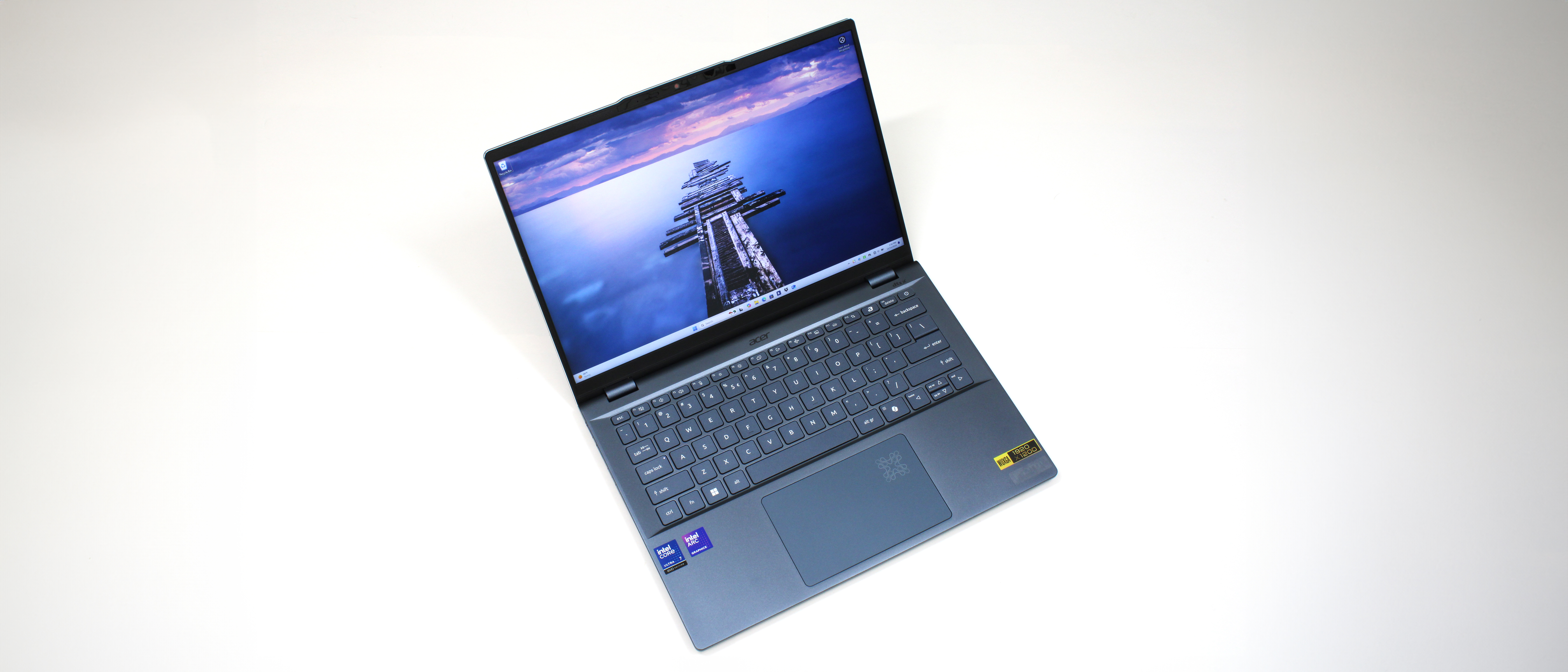Laptop Mag Verdict
The Acer Swift 14 AI Intel is a decent productivity laptop with some highlight features, but not so good that you should add it to your cart immediately.
Pros
- +
Long battery life
- +
Smoother than expected gaming performance
- +
Thin and lightweight
- +
Great color accuracy and coverage
- +
Cool thermals
Cons
- -
Heavy multitasking is sluggish
- -
Display could be a bit brighter
Why you can trust Laptop Mag
The Acer Swift 14 AI Intel is a decent productivity laptop with some highlight features, but not so good that you should add it to your cart immediately.
It’s speedy, its integrated graphics can handle games well, its battery life lasts nearly double the regular workday, and its display pops with color. It’s not the kind of productivity laptop that most people would return after using it for a week, and yet I was still disappointed. It won’t be popping up on our best laptops page.
Maybe I’ve reviewed too many laptops over the last six years, and I’m jaded. Or maybe I’m becoming more nostalgic as I get older. This laptop makes me long for those exciting Intel Inside commercials from the '90s and 2000s — because the Intel chip inside pulls this laptop down from where it should be.
Acer Swift 14 AI (Intel): Specs and benchmarks
Price: | $1,299.99 |
CPU: | Intel Core Ultra 7 258V |
GPU: | Intel Arc 140V (16GB) |
RAM: | 32GB (shared memory) |
Storage: | 1TB SSD |
Display: | 14-inch (1920 x 1200) 60Hz, IPS touchscreen |
Battery (HH:MM): | 15:53 |
Dimensions: | 12.30 x 8.71 x 0.38 ~ 0.63 inches |
Weight: | 2.95 pounds |
Click to view full benchmark test results
| Header Cell - Column 0 | Acer Swift 14 AI (Intel) |
|---|---|
Geekbench 6 (Higher is better) | 11,009 |
Handbrake conversion (Lower is better) | 7:02 |
BlackMagic Write (SSD speed) | 3883.0 MBps |
BlackMagic Read (SSD speed) | 3805.9 MBps |
Heat (Degrees Fahrenheit) | 81.5 |
Battery life (Higher is better) | 15:53 |
Display brightness (Higher is better) | 380 |
sRGB color gamut (Higher is better) | 119.0% |
DCI-P3 color gamut (Higher is better) | 84.3% |
Color accuracy (Lower is better) | 0.22 |
Sid Meier's Civ VI: Gathering Storm (1080p) | 62 fps |
Borderlands 3 (1080p) | 25 fps |
Shadow of the Tomb Raider | 29 fps |
Acer Swift 14 AI (Intel): Price and configurations
The Acer Swift 14 AI is available in several different configurations. The $1,299 Intel model I reviewed features a Core Ultra 7 258V processor, a 1TB SSD, and 32GB of shared RAM. (The laptop’s memory is integrated with the processor, not separately attached to the motherboard — so it can’t be increased before or after sale. Intel says it’s not going to make this controversial design again.) The 14-inch touchscreen display sports a native 1920 x 1200 resolution, a 60Hz refresh rate, and an IPS panel.
Two other, near-identical Intel configurations cost $100 less ($1,199): both the 14-inch and 16-inch models offer a slightly slower Intel Core Ultra 7 256V processor and 16GB of shared RAM. However, the one with the larger display has a higher 2880 x 1800 resolution and a faster 120Hz refresh rate.
For the same price, there’s also an AMD model with a Ryzen AI 9 365, which features 16GB of RAM (non-shared), a 1TB SSD, and the same touchscreen display.
But starting at $1,049, you can get the same Swift 14 AI with a Qualcomm Snapdragon processor (running Windows on ARM), a slightly larger 14.5-inch display, a 2560 x 1600 resolution, and a 120Hz refresh rate. For $50 more ($1,099), you can get it with a touchscreen.
Acer Swift 14 AI (Intel): Design
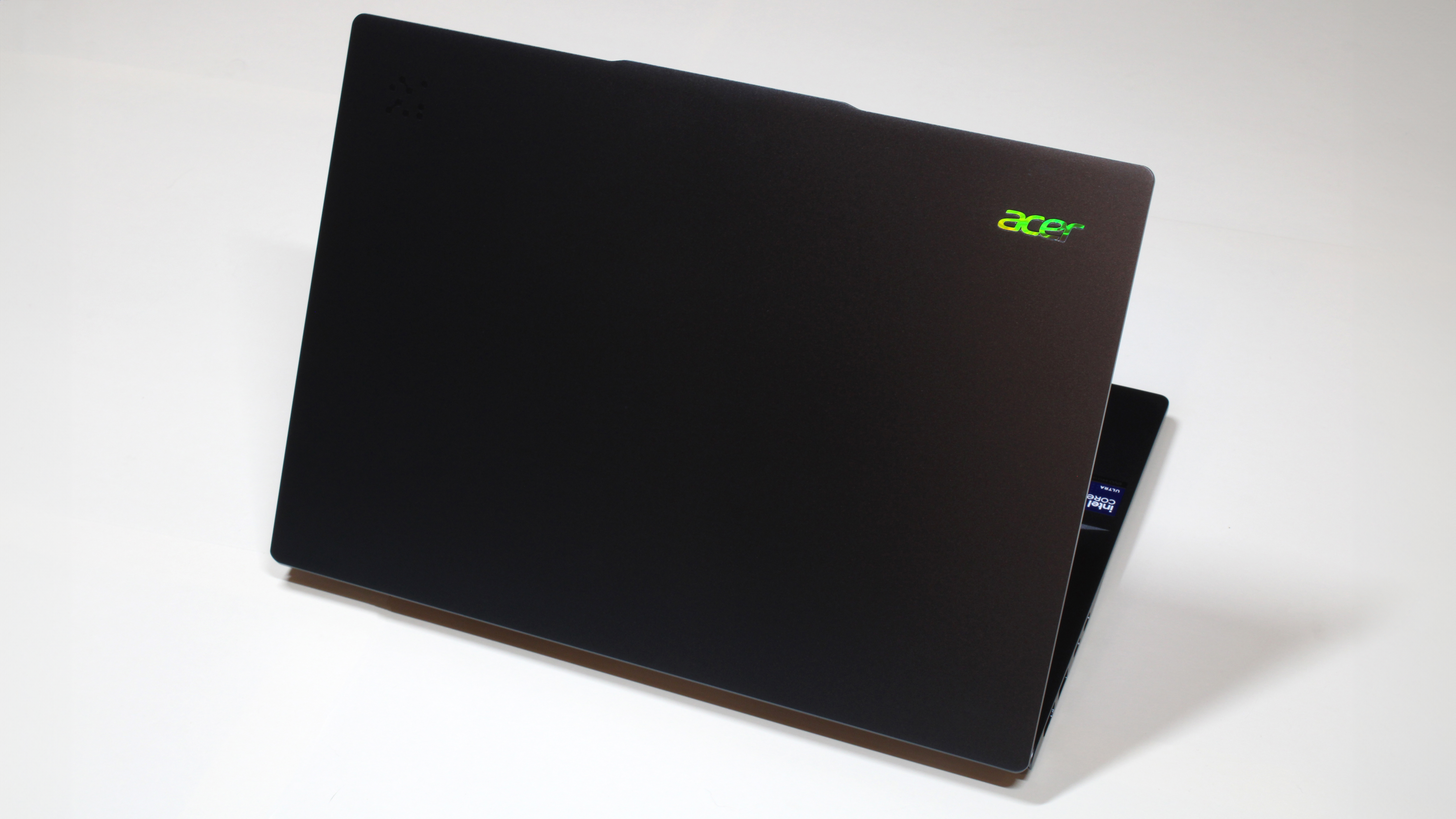
This laptop’s lovely dark, metallic-like finish keeps it from looking bland. (Acer calls it Steam Blue, but it can look black or light gray, depending on the lighting.) The Acer logo etched into the lid’s top right corner is small and unobtrusive and becomes a prism, casting almost an entire rainbow of colors when it reflects light. I spent a few minutes tilting it back and forth, watching the colors glide across the logo, murmuring, “Oh, shiny!” to myself. (I’m easily entertained.)
All the vents are on the underside, which also helps this laptop look sleeker and leaves more than enough space for a good-sized keyboard and trackpad. The keyboard spans almost the entire laptop width, leaving a ¾-inch border on the left and right sides. There’s no numpad, a good thing since there’s not enough space for one unless the keys were tiny and squished.
The trackpad is nearly 5 inches long, starting from the left side of the spacebar and ending at the Copilot key. It’s 3 inches wide, with a half-inch gap separating the top from the keyboard and the bottom from the laptop’s edge. It’s not the largest trackpad Laptop Mag has ever tested, but it covers enough chassis.
The Swift’s dual-hinge design firmly holds the display, however it’s angled. The display’s half-inch bottom bezel makes the hinge style look more refined. The top bezel has a long notch across the middle, which makes space for the webcam and manual privacy shutter switch.
At 12.30 x 8.71 x 0.38 ~ 0.63 inches and weighing 2.95 pounds, it’s one of the lightest and thinnest devices Laptop Mag has reviewed.
I took it with me on a weekend vacation recently. There were several times throughout the three-hour drive to my destination when I had to take it off my lap to grab something from my bag near my feet or something from the backseat; I was able to pick it up with one hand and hold it in the air without while I did that without it straining my wrist. When I had it in my bag, slung over my shoulder, the added weight didn’t make it more difficult to pull my suitcase out of the trunk (and I tend to overpack!).
Here’s how it compares to some of the best 14-inch and touchscreen laptops:
- Apple MacBook Pro M4: 12.3 x 8.7 x 0.6 inches, 3.4 lbs.
- Acer Swift 14 AI (Qualcomm): 12.7 x 9.0 x 0.66 ~ 0.72 inches, 3.2 lbs.
- HP Spectre x360 14 (2024): 12.4 x 8.7 x 0.7 inches, 3.2 lbs.
Acer Swift 14 AI (Intel): Ports
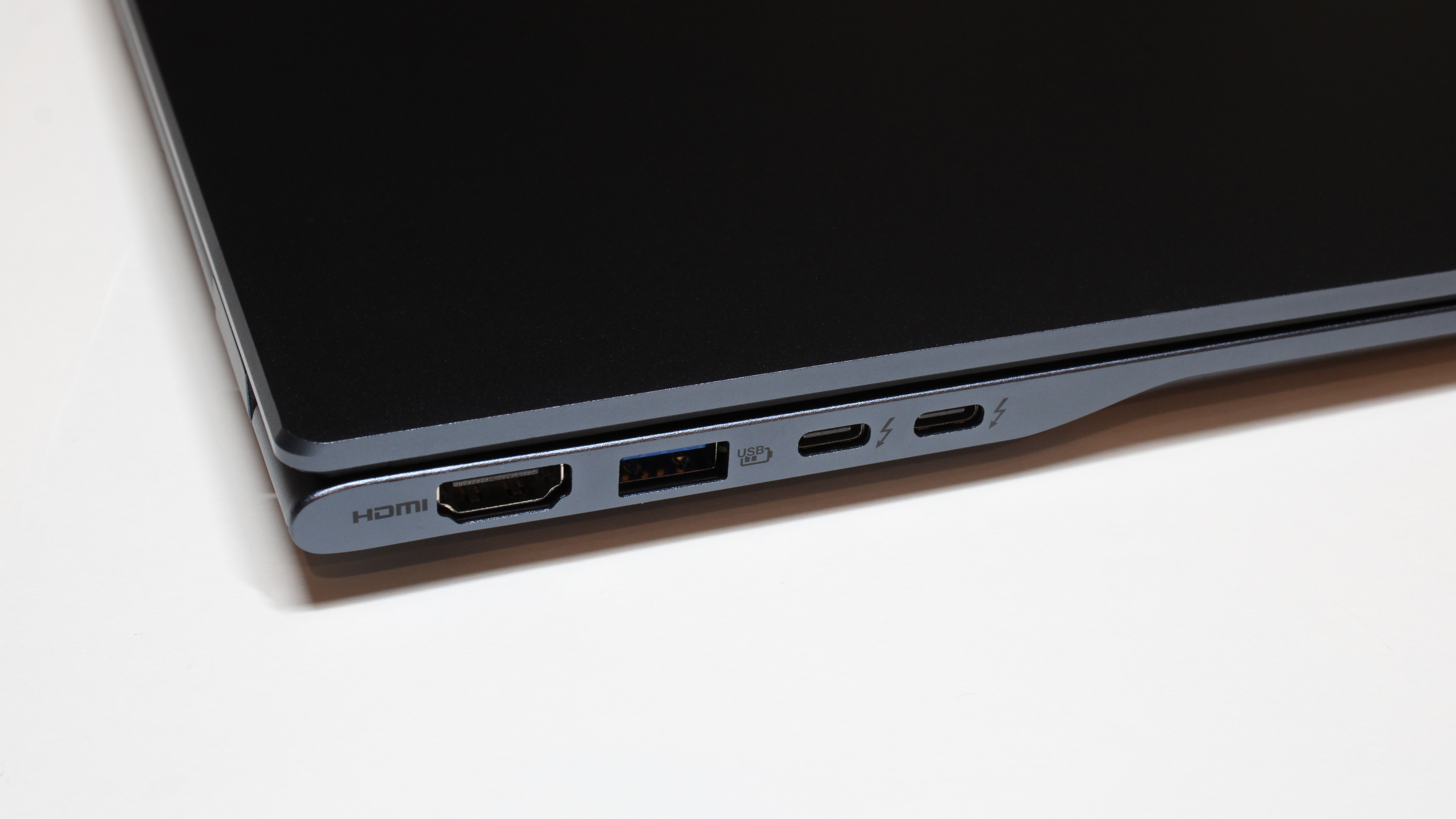
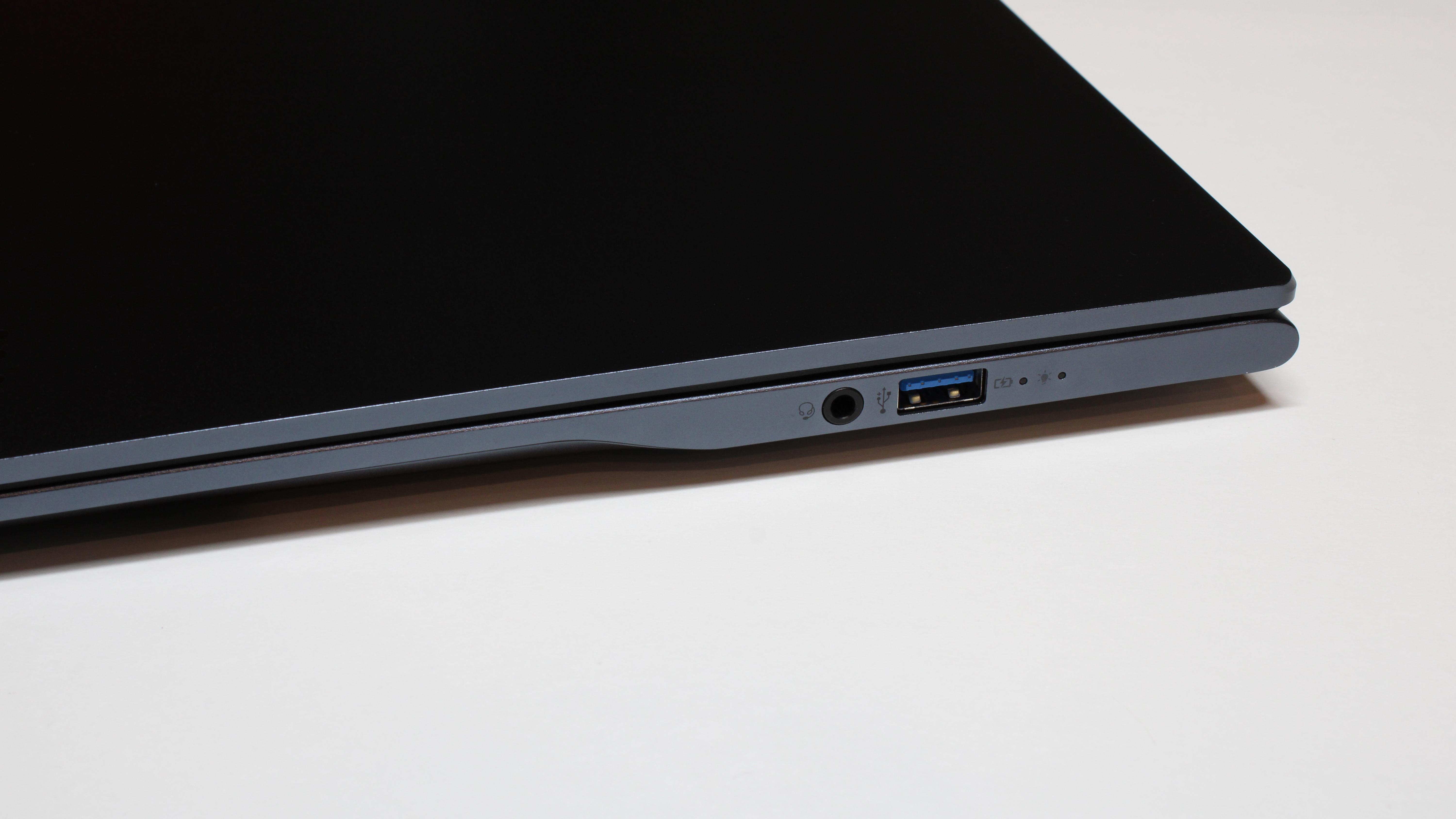
The Acer Swift 14 AI offers just the right number and type of essential ports.
- HDMI
- Two USB-A 3.2 Gen 1
- Two USB-C Thunderbolt 4 ports with pass-through charging and DisplayPort support.
- Headphone jack
I especially appreciate that this laptop supports both HDMI and DisplayPort; if I’m not working at home, I’m in a classroom, where I’m sometimes not sure what display connectivity will be available. It’s nice to be prepared for either!
If you need more ports, there are plenty of great USB-C hubs and laptop docking stations available.
Acer Swift 14 AI (Intel): Battery life
At a commendable 15 hours and 53 minutes, the Swift AI 14 features one of the longest battery lives Laptop Mag tested in 2024, exceeding the average premium laptop by about 2 hours and 30 minutes (13:23) and the Asus Zenbook S14 by two hours (13:51). It’s not the longest-lasting laptop battery we’ve tested, either. The non-OLED Dell XPS 13 9350 (Intel Core Ultra 7 258V) lasted 18 hours and 34 minutes, and its Snapdragon X Elite counterpart made it to 19 hours and 1 minute.
Even still, I didn’t need to charge it when I was on vacation for two days, though I only used it for light productivity tasks like writing or grading my students’ work, and streaming videos on YouTube. It got me through the entire car ride there and back (a total of five hours), plus another two hours of on and off use to check tour times and local restaurant hours. The battery was just below 50% when I got back home.
Click to view chart data in table format
| Header Cell - Column 0 | Acer Swift 14 AI (Intel) | Acer Swift 14 AI (Qualcomm) | MacBook Air 13 M3 | Lenovo Slim 7i Gen 9 | Premium laptops average |
|---|---|---|---|---|---|
Battery life (Higher is better, HH.MM) | 15:53 | 18:05 | 09:51 | 10:04 | 13:23 |
Acer Swift 14 AI (Intel): Display
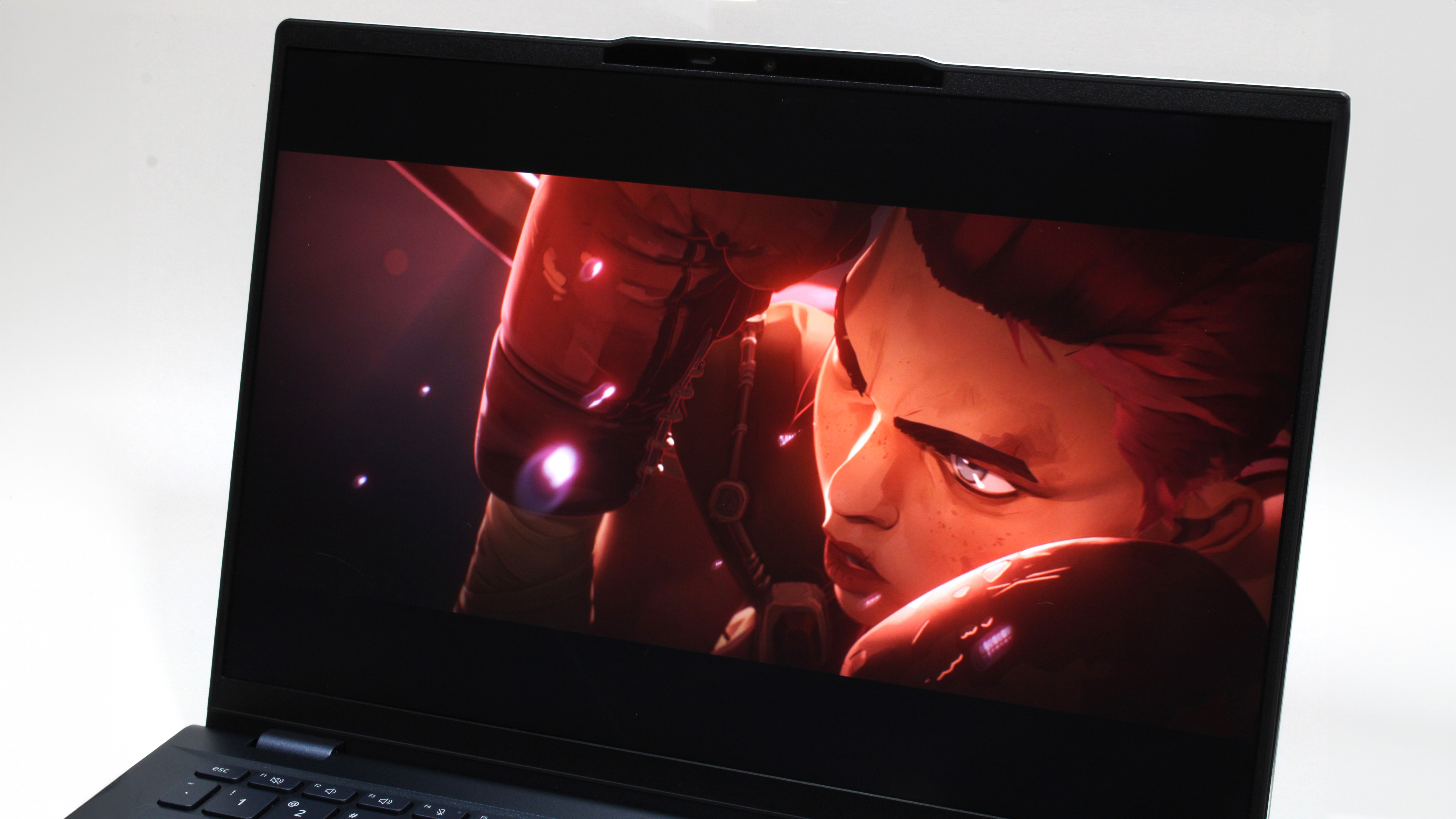
OLED technology tends to offer bolder colors and deeper blacks unlike IPS, but that didn’t stop the Acer Swift 14 AI’s 14-inch, 1920 x 1200, 60Hz touchscreen from killing it with a vibrant display. I was especially impressed with how well the display handled one scene in season one, episode two of Arcane, where the kids are underground playing arcade games.
Claggor, chillin’ off to the side, appeared appropriately pensive when he was lit with warm lighting. The shooting game exploded with bright neon colors, creating a dazzling rave every time Powder shot a ball directly through a target. The display’s contrast was pretty on-point here, too; neon colors looked best against total black, and while the Swift AI 14 can’t reach the same depth as OLED, it was sometimes hard for me to tell where the show’s letterboxing border started and ended.
Covering 84.3% of the DCI-P3 color gamut, this laptop’s display is seriously impressive, and right up there with the average premium laptop (84.7%). It covers more than its Snapdragon Swift AI 14 sibling (75.6%), the MacBook Air 13 M3 (77.5%), the Dell Inspiron 14 Plus (69.1%) and is nearly the same as the Asus Zenbook S 14 (82%) and HP Spectre x360 (85.8%) With a Delta-E of 0.22, it has good color accuracy on-par with the Zenbook and Spectre, too.
The Swift AI 14’s average brightness clocked in at 380 nits. That’s below the premium laptop average of 450 nits, but it’s not so dim that everything on screen gets washed out when hit with harsh light. If I kept the display at max brightness, any glare that remained didn’t become a distraction.
The display is still brighter than some of its main competitors: the Zenbook S14 (342 nits), the Snapdragon Swift AI 14 (367 nits) and the HP Spectre (366 nits). The Inspiron 14 Plus (470 nits) literally outshines it, though.
Click to view chart data in table format.
| Header Cell - Column 0 | Acer Swift 14 AI (Intel) | Acer Swift 14 AI (Qualcomm) | MacBook Air 13 M3 | Lenovo Slim 7i Gen 9 | Premium laptops average |
|---|---|---|---|---|---|
Display brightness (Higher is better) | 380 | 558 | 373 | 382 | 434 |
sRGB color gamut (Higher is better) | 119.0% | 116.0% | 149.0% | 188.8% | 120.0% |
DCI-P3 color gamut (Higher is better) | 84.3% | 81.8% | 105.7% | 133.8% | 84.7% |
Color accuracy (Lower is better) | 0.22 | 0.13 | 0.33 | 0.39 | N/A |
Acer Swift 14 AI (Intel): Keyboard and touchpad
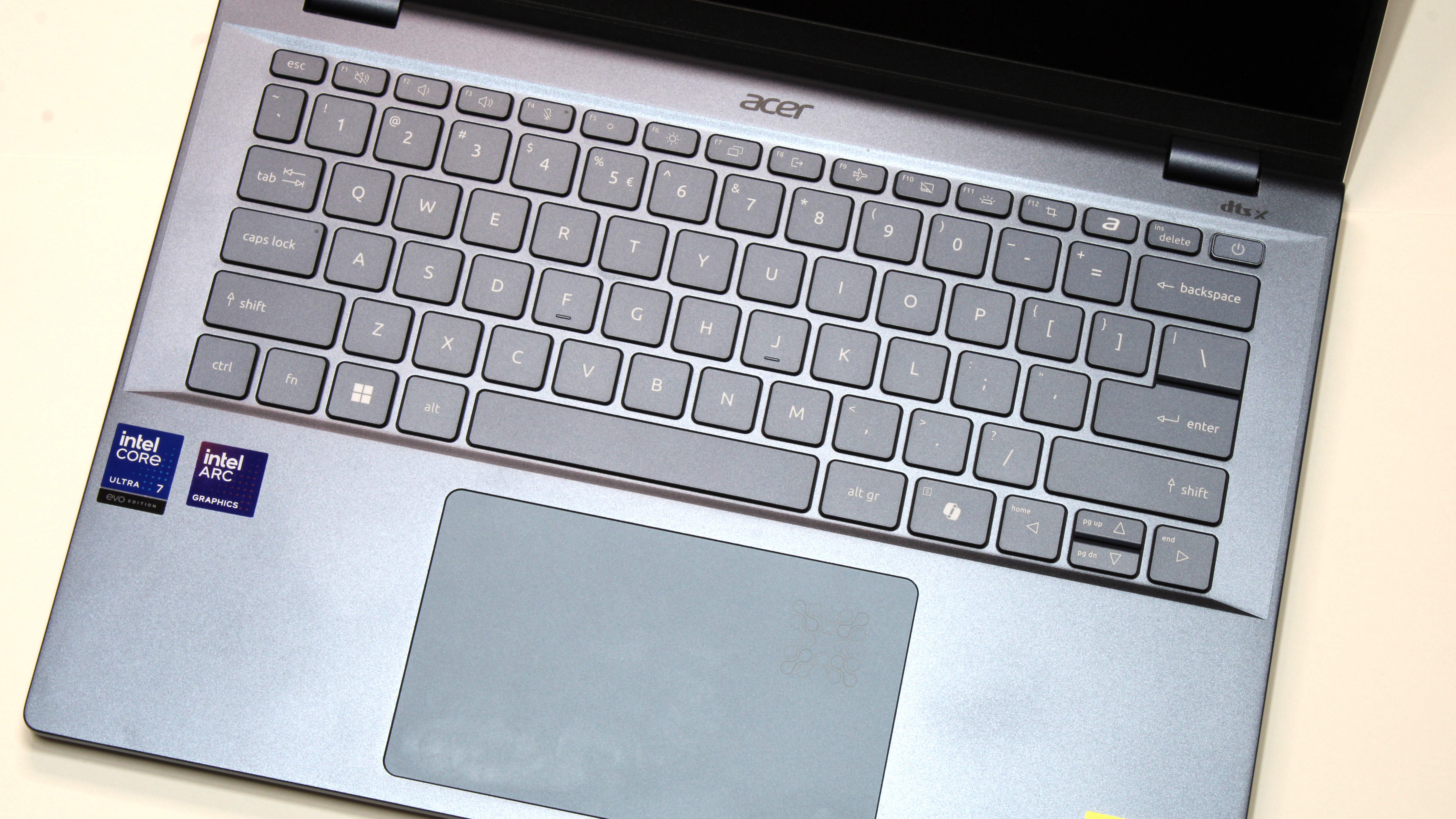
I like the Swift AI 14’s keyboard and touchpad, but I don’t love them. Pressing the keys walks a fine line between springy and clicky, and soft and quiet. And while the size of the keys and their spacing are nearly the same as the other 14-inch notebooks, I’ve typed on much snappier keys. The Swift AI 14’s keyboard is like running through shallow mud: just enough to slow you down.
Using Monkeytype’s typing test, I only reached 68 words per minute (WPM) with 85% accuracy. That’s below how fast I can type with the keyboard I use every day: 81 WPM with 90% accuracy.
The trackpad is much better. Not the smoothest I’ve ever used, but my fingers don’t skip over the surface or catch on it. It’s accurate and responsive too, never missing a tap or swipe, and pressing down on it registers a full, satisfying click. But driving to and back from my vacation, the trackpad sometimes did not understand what I was trying to do.
I had to place two fingers all the way on the left side if I wanted to scroll through a web page or document. When I placed the cursor in the middle of a sentence with a tap, it scrolled to the top or the end of the page instead.
I tried changing the sensitivity settings, but that didn’t help, so this might be a performance issue.
Acer Swift 14 AI (Intel): Audio
The Acer Swift 14 AI’s speakers pumped out louder volume and a heavier bass than I was expecting. Rob Zombie’s “Dragula” is one of my go-to songs for laptop testing, mainly because of how hard the bassline kicks in at the start of the chorus. Most laptop speakers drain that part of all its aggressive fun, but this laptop’s bottom-firing speakers work to the song’s advantage so long as the laptop is placed on a flat surface. (Les Claypool’s bass came through clear in Primus’ “My Name is Mud,” too.)
But Rob Zombie’s vocals were quiet and tinny. He sounded far away, like listening to music coming out from another car when you’re stopped at a red light, as did most of the other songs on my playlist. In Bloodywood’s “Gaddaar,” Jayant Bhadula’s growls kept most of their intimidating depth, and the song had more life than the rest of the songs on my playlist.
Acer Swift 14 AI (Intel): Performance and heat
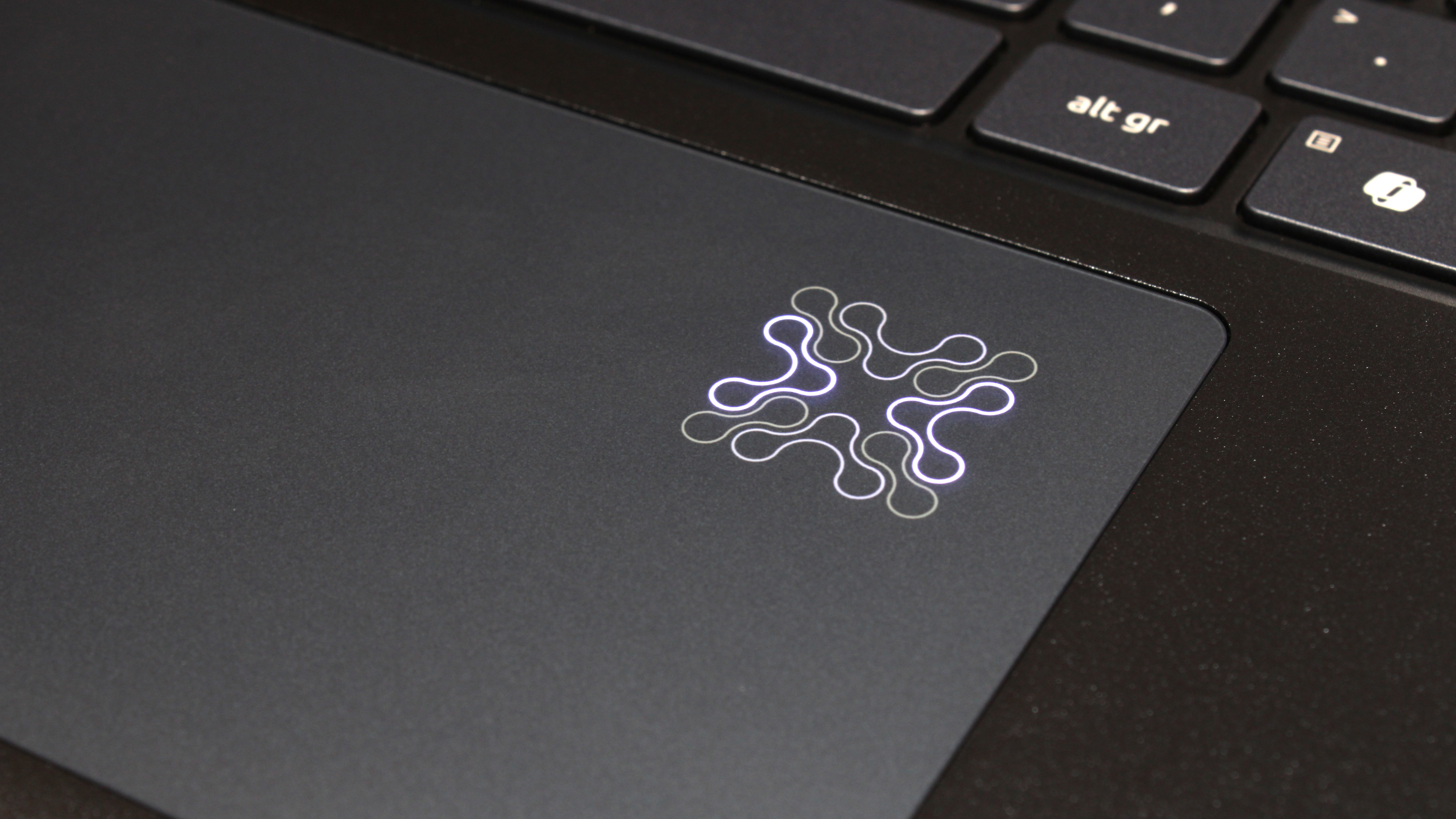
The Intel Core Ultra 7 258V packed into the Acer Swift 14 AI is a conundrum — not just compared to competing AMD, Qualcomm, and Apple laptops, but especially compared to laptops with Intel’s last-gen Meteor Lake processors. Intel made some major architectural changes with its newest chip generation, and it seems like those changes resulted in disparate single-core and multicore benchmarks. (If you feel like getting weedsy, Tom’s Hardware has a wonderful breakdown.)
While combing through Laptop Mag’s past reviews, I noticed the Core Ultra 7 258V does feature better single-core performance compared to laptops with a last-gen Core Ultra 7 155H, but its multicore performance is closer to the Core Ultra 5 125H, the lower end of those two chips.
On the Geekbench 6 benchmark, the Swift 14 AI with the Intel Core Ultra 7 258V scored 2,753 in single-core performance, making it about 12% faster than the Lenovo Slim 7i Gen 9 with a Core Ultra 7 155H (2,432) and 19% faster than the Lenovo ThinkBook 13 G4 with a Core Ultra 5 125H (2,253). It even outpaces the Asus Vivobook S15 with a Snapdragon X Elite X1E-78-100 by 12% (2,432) and is near-equivalent to the Asus Zenbook S16 with an AMD Ryzen AI 9 HX 370 (2,765).
Now for the conundrum: the Swift 14 AI scored just 11,009 in multicore performance. That’s 10% slower than the Slim 7i Gen 9 (12,111), and nearly the same as the ThinkBook 13 G4 (11,058). Compared to the Acer Swift 14 AI with a Snapdragon X Elite X1E-78-100, it’s 25% slower (14,531), and it’s about 8% slower than the Asus Zenbook S16 (13,282). How about compared to the MacBook Air 13 M3? 9% slower (12,052).
This could explain why I experienced slower multitasking performance than I expected — especially when I had over a dozen tabs open in the Edge browser while running Spotify, Microsoft Word, Slack, and Discord at the same time. Switching from one app to another was sluggish at times (for a mid-tier processor in 2024), especially when I moved tabs between browser windows or arranged them into groups within the same window.
You might have guessed that since I used the Swift AI 14 for several hours on my lap in the car, then it must stay cool. If you did, you’re right. In Laptop Mag’s testing, the hottest point on the laptop was above the F8 button on the keyboard — 81.5 degrees, which is well below our 95-degree comfort threshold.
The underside didn’t get hotter than 76 degrees, so I was able to place this laptop directly on my bare skin! The only heat I ever felt was a slightly warm tickle when the fans kicked on for a few seconds. The rest of the laptop stayed similarly cool, with the touchpad reaching a high of 71 and the G/H keys reaching 77 degrees.
Click to view chart data in table format.
| Header Cell - Column 0 | Acer Swift 14 AI (Intel) | Acer Swift 14 AI (Qualcomm) | MacBook Air 13 M3 | Lenovo Slim 7i Gen 9 | Premium laptops average |
|---|---|---|---|---|---|
Geekbench 6 (Higher is better) | 11,009 | 14,531 | 12,141 | 12,111 | 10,492 |
Handbrake conversion (Lower is better, MM.SS) | 7:02 | 4:38 | 3:53 | 5:21 | 6:18 |
BlackMagic Write (Higher is better, MBps) | 3883.0 MBps | N/A | 3058.8 MBps | N/A | 3370.8 MBps |
BlackMagic Read (Higher is better, MBps) | 3805.9 MBps | N/A | 3030.7 MBps | N/A | 3357.4 MBps |
Heat (Degrees Fahrenheit, 95 comfort threshold) | 81.5 | 82.0 | 84.6 | 94.8 | N/A |
Acer Swift 14 AI (Intel): Gaming and graphics
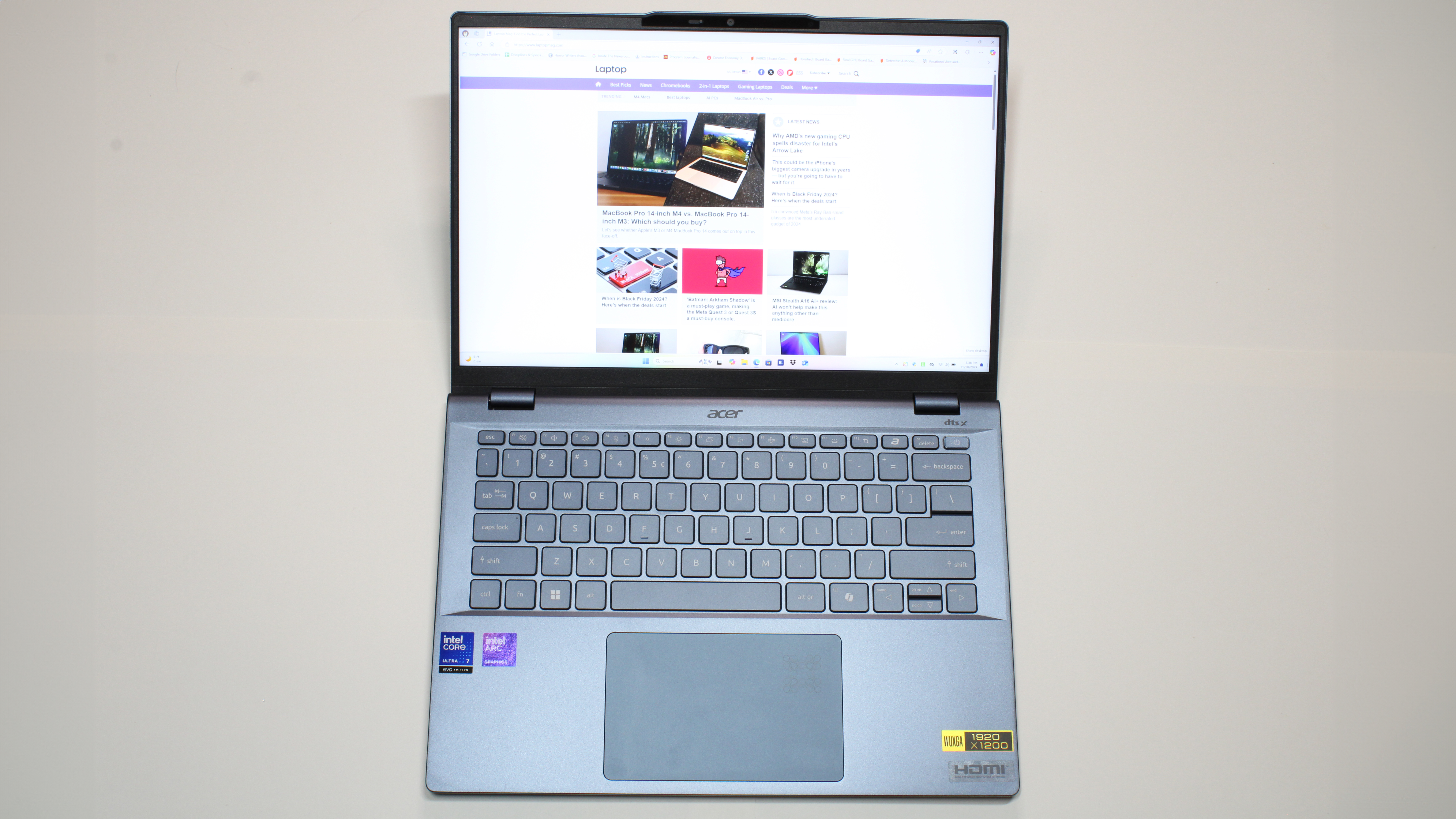
While the Acer Swift 14 AI features integrated graphics, via the Intel Arc 140V (16GB) graphics chip, it performs surprisingly well while gaming.
On the 3DMark Fire Strike synthetic graphics test, the Swift AI 14 scored 8,856, 12% higher than the Intel Core Ultra 7 258V in the Zenbook S14 (7,806). It’s also 6% higher than the AMD Ryzen AI 9 in the Zenbook S16 (7,468), and 22% higher than Intel’s last-gen Core Ultra in the HP Spectre x360 (6,986). It obliterates the Swift AI 14 with a Snapdragon X Elite X1E-78-100 by 35% (5,754).
Set to 1080p and Medium visual settings, the Swift AI 14 averaged 61 frames per second (fps) on the Sid Mieier’s Civilization VI: Gathering Storm benchmark, double Laptop Mag’s minimum threshold of 30 fps. It bested the Asus Zenbook S14 (48 fps) and MacBook Air 13 M3 (51 fps). But compared to the HP Spectre x360 (36 fps) and the Snapdragon Swift AI 14 (21 fps), its leap in graphics performance is way more impressive!
The Swift AI 14 also beats some of its main competitors in games that push the graphics harder. It averaged 29 fps in Shadow of the Tomb Raider (Ultra, 1080p), but you could probably get up to 60 fps when you turn down the graphics. Compared to the graphics power in the Zenbook S14, though, the Swift AI 14 has the better chip. The S14 averaged just 19 fps in the same game.
Playing games on the Swift AI 14 started as a great experience. In Palia (a game I am very much stuck on at the moment), the frame rate hovered near 60 fps and ran smooth overall when set to 1080p and Medium graphics. But after 15 to 20 minutes, the game lagged and stuttered, and the frame rate wildly fluctuated — even with VSync turned on, which is supposed to help prevent that.
Click to view chart data in table format.
| Header Cell - Column 0 | Acer Swift 14 AI (Intel) | Acer Swift 14 AI (Qualcomm) | MacBook Air 13 M3 | Lenovo Slim 7i Gen 9 | Premium laptops average |
|---|---|---|---|---|---|
Sid Meier's Civ VI: Gathering Storm (1080p, FPS) | 62 fps | 56 fps | 128 fps | 41 fps | 43 fps |
Borderlands 3 (1080p, FPS) | 25 fps | 57 fps | 16 fps | N/A | 33 fps |
Shadow of the Tomb Raider (1080p, FPS) | 29 fps | 119 fps | 74 fps | N/A | 53 fps |
Acer Swift 14 AI (Intel): AI features
This laptop might not be a Copilot+ PC yet, but a free update with Microsoft’s AI programs (Windows Studio Effects, Live Captions, and the controversial Recall) should be rolling out to all Intel Core Ultra 200V series laptops by the end of this year. The Intel AI Playground is available to download.
Real-world AI benchmarks are still tricky to implement (you can read all about how we test AI PCs here), so Laptop Mag focuses on running formalized synthetic benchmarks, like Geekbench ML.
In GeekBench’s ML 0.6 CPU test, the Swift AI 14 scored 3,441. The Snapdragon Swift scored 2,925, but it may not be optimized for Geekbench ML 0.6, since it doesn’t test the NPU, so its score may not accurately represent what it’s capable of.
I did try to make heads or tails of the Microsoft AI companion on the Swift AI 14, even though I’m generally skeptical (to put it mildly) of all this AI stuff. So, I asked the AI companion if Recall was available on the laptop, but it only understood what I was talking about when I typed my question into the chat. I also asked it to check my calendar and tell me if I had any meetings next week and just about died laughing when it responded, “I can’t check your calendar, but you can try giving it a look yourself.”
Wow, Microsoft AI companion. Wow.
Acer Swift 14 AI (Intel): Webcam

Swift AI 14 has a darn-good, 1440p webcam. Whether under fluorescent light or natural light, I could see the distinct color patterns of my diplomas hanging on the wall in the background. Even on some of the dolls I keep on shelves above them. The blue-green portions of my hair looked vibrant, and I could make out a few flyaway strands that stuck out from the top of my scalp.
When my home office was lit with just my 27-inch desktop monitor and the Swift’s display, I was surprised at how accurately it still captured the red skeleton sitting in front of a vintage computer on my t-shirt, and even some of the dyed portions of my hair. My face was a little blurry, and there was a little bit of grain, but I didn’t look too underexposed.
The webcam does a better job at balancing cool lighting sources in a dim or dark environment than warm lighting sources, though. When I had my Ikea Tärnaby table lamp turned on at the same time as the laptop screen, the webcam overcompensated for the lamp’s warm lighting and cast a bluish tone over my face.
If you're still not sold on the built-in webcam being enough, check out our best webcams for the best possible image quality.
Acer Swift 14 AI (Intel): Software and warranty
Like most Acer laptops, the Swift AI 14 comes with a standard one-year warranty and the company’s own system information program, AcerSense. Here you can change the laptop’s power settings, basic display settings, check the system’s performance and battery health, and pin shortcuts to your most-used apps.
There are also a bunch of software and apps that you may or may not want: AppExplorer, Booking.com, a Dropbox promotion, an Xbox Game Pass promotion, Acer LiveArt, two separate DTS sound applications, Intel Unison (another take on Windows Phone Link), and ExpressVPN. There are even two games, Elvenar and Forge of Empires, pre-installed (which I’ve never played and don’t intend to).
Some apps, like Acer Assist, the company’s own AI chatbot that runs locally on the laptop, aren’t pre-installed on the laptop.
Bottom line
Anyone looking to upgrade from a laptop that’s three or more years old will get the most out of everything the Acer Swift 14 AI offers. From battery life to performance across productivity apps and even some gaming, it would be a massive upgrade for a reasonable starting price of $1,199. You probably won’t even notice the same sluggishness I did when I had a bunch of browser tabs and apps open at the same time.
But if heavy multitasking is your game, I still feel compelled to steer you away from this laptop simply because the Snapdragon Swift AI 14 is a much better laptop for that kind of use — and its battery lasts nearly two more hours on a full charge. More than that, though, the display offers a higher resolution and refresh rate. It’s a tad heavier and thicker, but barely. There’s less RAM, but it doesn’t affect that laptop’s overall performance. The display isn’t as color-accurate, but a laggy laptop is much more infuriating. You also get immediate access to Microsoft Copilot+ PC features — and that laptop is $100 less than the Intel version I reviewed here.
If that one still doesn’t look good to you, there’s always these best laptops.

Joanna Nelius is a contributing writer to Laptop Mag. She has reported on and reviewed laptops for The Verge, Gizmodo, PC Gamer, and USA Today.
